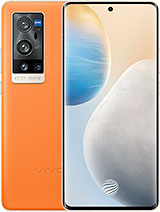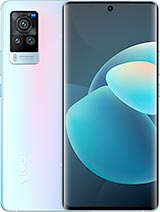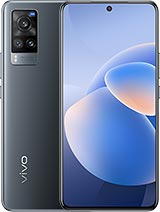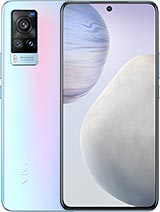Vivo X60 Pro review By GSMArena Official
Hey everyone Vito's new x60 lineup, has a lot of options, perhaps overwhelmingly so and with names like the pro plus on the list. Well, the naming doesn't help clear up the confusion either today we're looking at the VIVO x60 pro, which is priced in the upper mid-range, despite the name, it actually bears the most similarity to the Chinese x60, so confusing marketing aside, if you're looking at premium mid-rangers, should this phone be on your list, I'm Angie for gs, marina- and this is our review of the VIVO x60 pro. It's clear that the VIVO x60 pro is a high-end phone from the moment that you take it out of the box. It's an elegant device with curved display edges, a very thin aluminum frame and gorilla glass 6 on the front and back it's light and comfortable in the hand and the buttons are nice and click, though we do wish that they were a bit wider. The back has a frosty looking finish that keeps fingerprints at bay, but it's also incredibly slippery. The camera bump has a nice design too, though it sticks out significantly.
If you choose to use the phone without a case on the front, you'll find incredibly slim bezels and a small centered hole punch, there's an optical fingerprint reader that works fast and reliably, though it might feel odd at first, if you're coming from a Samsung phone since it's a bit lower than on galaxy devices. As for the display itself, the x60 pro has a 6.5 inch AMOLED panel, with a full HD resolution and a 120hz refresh rate and a 240hz sampling rate. It supports HDR, 10 plus, and we got HDR streams from both YouTube and Netflix. It is a curved panel, so it won't be everyone's cup of tea, but as far as usability is concerned, it didn't have a tendency to misinterpret touch input. Furthermore, it's also a very good screen.
Overall, the display got a maximum brightness of 818 nits, so you'll have no trouble at all using it. On a sunny day, it's color accurate too, and if you measure the color temperature slider a little to the right in settings, it's essentially perfect. If you're in the 120hz mode you'll have that refresh rate pretty consistently. The only exceptions would be when you're, using the camera, viewfinder Google Maps or have a video full screen, there's a smart switch mode that maintains the high refresh rate when you're actively touching the display and then drops it down to 60hz to preserve battery. Unlike the stereo speakers on the x60 pro plus you'll only find a downward firing speaker, it's a bit disappointing.
That VIVO chose to exclude this feature for price differentiation, considering how common stereo speakers are in this price range. The sound quality isn't impressive, either with a nearly non-existent base and treble still it's nice to know that it scored a very good rank in our tests. In terms of loudness, the phone has a 4 200 William hour battery, which is on the lower side of the spectrum combined with its powerful, but not very frugal chipset. It isn't all that surprising that the x60 pro scored an unimpressive 77 hours in our endurance tests with the 33 watt charger. The phone ships with charging was much better, and we got from flat to a full charge in 56 minutes.
The phone comes with 12 gigabytes of ram and 256 gigabytes of UFS 3.1 flash storage, unlike the snapdragon 888 on the VIVO x60 pro plus the regular x60 pro has Qualcomm's second-best chipset, the snapdragon 870 5g. Its performance is excellent for the class and is only outperformed by this year's flagship chipsets. The x60 pro sports android 11, with fun touch 11.1 on top, while the fun touch OS on the VIVO v20 was a little more stock. This one is the opposite: you'll find the basics like a recorder, an AI editor for easier video, editing and eye manager, which summarizes your phone's performance. There's plenty to customize, too.
You can change the font themes and there is a lot more always on display styles. This includes an ambient light effect which lights up the edges of the display for notifications and calls replacing the need for a notification led. You can also change the system animations in the dynamic effects. Menu you'll find new android 11 features too, like bubbles, better permissions handling, a built-in screen recorder and a completely redesigned power menu. The ultra game mode lets you minimize disturbances while gaming and gives you the option to turn off your phone's screen.
While the game is still running in the foreground, which saves some energy in games that don't require your attention all the time. The triple camera setup on the back consists of a 48 megapixel main sensor with gimbals stabilization, there's also a 13 megapixel ultrawide camera with phase detection autofocus and a 13 megapixel telephoto camera with two times optical zoom. The main camera itself is mounted on a movable platform which should correct for shakes and rotations around all three axes: VIVO collaborated with mass optics on the lenses and processing, so it'll be interesting to see if we can spot any differences when taking shots during the day. The first thing that we noted was how saturated the images were. Well, it's understandable that VIVO is aiming for a more vivid look, many prefer more natural.
Looking colors, it turned out that the AI mode is on by default and even when it doesn't recognize the scene, it still bumps up the color saturation. Turning it off results in substantially more natural images, though they too are more saturated than what we've gotten used to other than that noise was low. The dynamic range is reasonably wide and there's plenty of contrast. Detail levels are alright. For the most part, though, we did notice the occasional ghosting if you choose to capture shots at the full 48 megapixel resolution, you'll notice, more noise and less saturation, but no meaningful increase in detail.
The two-time zoom shots during the day are taken by the telephoto. The dynamic range is good, though not great, while sharpness detail and noise levels were great for the class. This is one of the better ultra rides you'll find in the upper mid-range. There's practically no noise sharpness is excellent. Dynamic range is wide and colors have the same processing as on the other cameras, thanks to the autofocus, you can get right up to your subject and use it to take really impressive macro shots too.
In low light. The x60 pro has some night mode like processing by default, possibly due to the AI mode images, look good with excellent detail. Minimal noise and a wide dynamic range colors are still a little too saturated for our taste, but is better than having a loss in saturation, while switching night mode on does make a difference. It's a subtle one. The exposure is brighter and images have a little extra pop.
We also found there to be less noise. If you choose to zoom in the VIVO will use the main camera for some shots. Ones taken with the telephoto are a bit sharper, but generally all of them had good dynamic range and vivid color rendition with night mode on the differences are minor, and we mainly noticed a boost in the shadows. There's less sharpness in some photos. So if your scene is better lit, you might get nicer results with the regular photo mode.
The ultrawide camera is also commendable in the dark doing much better than much of its competition. It can't quite match the main camera's dynamic range, but you'll generally get good results, switch the night mode on, and you won't see much of a difference and some shots actually look softer, so you should just stick with the regular photo mode for most shots. The x60 pro can capture portraits with either one time zoom or two time, zoom using the main or tell cameras. Wider shots have a grittier look through they generally have the same level of detail. Subject.
Detection was usually good, though it wasn't perfect. We generally recommend that you take several shots and choose one for best results. Dynamic range is excellent and colors were generally good. Thanks to the collaboration with mass, there is also an option to recreate mass's swirly both, though it works better on some backgrounds than on others. The 32 megapixel camera on the front captures shots with balanced lighting, wide dynamic range and excellent detail and good light.
There's all right detail and high contrast scenes where HDR takes a toll. Colors are a little muted, especially in comparison to the saturated output of the rear cameras. Selfie portraits were less reliable half the time we saw a blur effect in the viewfinder, only to get a regular selfie shot and then, when we did get them the subject. Detection wasn't always great around clothes. The x60 pro records video at up to 4k at 60fps, with the main camera or full HD at 30fps, with the ultrawide 4k footage itself was crisp and detailed little noise, in contrast to photos, the videos are low in saturation and have limited dynamic range.
The same holds true for all resolutions and from all three cameras. Unfortunately, there's only full HD with the tell camera. So if you zoom in you'll, be using the main camera, if you're in the 4k mode and shots aren't as sharp as what the dedicated camera could, output zooming in with the tell camera looks substantially better. You get wider dynamic range, nicer, colors and better resolve detail. The ultrawide camera had very good detail for a full HD clip, but it had the same narrow, dynamic range and muted colors as footage from the main camera.
There are two levels of stabilization standard, as and super anti-shake. Ea's is available on every camera, while the super anti-shake is only available on the main cam at a full HD resolution in both modes you get to take advantage of the gimbals, and the result is that the standard stabilization will get you exceptionally stable footage. On the other hand, the supposedly superior super anti-shake footage wasn't particularly impressive, and there was quite a bit of wobble in walking footage actually, where the stabilization was most impressive was with zoomed footage it's easily. Some of the most stable two-time zoom footage we've ever captured the VIVO x60 pro is a perfect phone, but it faces some stiff competition, most notably from the OnePlus 9 and the VIVO x60. Its sibling is actually priced, 20 cheaper, and it's almost the same aside from a flat display and no gimbals stabilization.
The OnePlus 9, on the other hand, has a more powerful chipset, a bigger battery and a larger ultrawide sensor. That said, aside from the unimpressive speaker and battery life, the VIVO x60 pro does a lot of things right. It has a gorgeous design with a very good screen, an excellent chipset and a great camera setup. So if you're looking at phones in the upper mid-range, this one definitely should be on your list. Thank you for watching everyone stay safe, and I'll, see you guys next time you.
Source : GSMArena Official

















![OPPO A74 Full Review [THE GOOD ALTERNATIVE]](https://img.youtube.com/vi/q4KgX6PlN98/maxresdefault.jpg )










